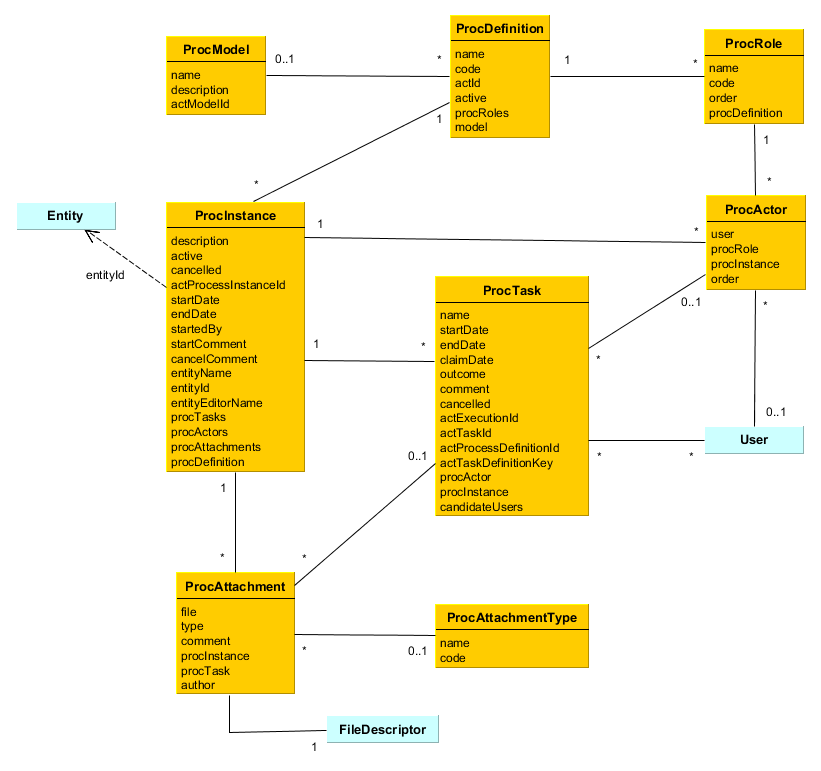2. Data Model

|
Tip
|
Attributes with names starting with |
-
ProcModel- the process model. Model attributes:-
name- the model name. -
description- the model description. -
actModelId- ID of a model from Activiti engine, stored in ACT_RE_MODEL table.
-
-
ProcDefinition- the process definition. Entity attributes:-
name- the process name. -
code- the process code. It can be used to determine an entity instance from the application code. -
actId- ID of a process from Activiti. -
active- defines, whether a new process instance start is allowed for the current ProcDefinition. -
procRoles- collection of objects that defines process actors. -
model- the reference to a model.
-
-
ProcRole- the process role. Objects of this type are created automatically on process deployment. ProcRole defines a process actor type. Entity attributes:-
name- the role name. -
code- the role code. It can be used by an application for a role identification. -
order- the order number. It can be used by an application to display roles in an appropriate order. -
procDefinition- the reference to a process definition.
-
-
ProcInstance- the process instance. ProcInstance can be started both with a link to a project entity and without a link. For example, the contract approval process instance can be linked with a contract entity. Entity attributes:-
description- the description of a process instance. -
startDate- the process instance start date. -
endDate- the process instance end date -
startedBy- the user who started a process. -
active- the indicator that shows if a process was started but hasn’t been completed yet. -
cancelled- the indicator that shows if a process was canceled. -
actProcessInstanceId- the identifier of the corresponding ProcessInstance from Activiti. -
startComment- the comment on process start. -
cancelComment- the comment on process cancel. -
entityName- the linked entity name. -
entityId- the linked entity ID. -
entityEditorName- the screen name that will be used to edit the linked entity. -
procTasks- the process tasks collection. -
procActors- the process actors collection. -
procAttachments- the process attachments collection.
-
-
ProcActor- the process participant. The entity defines an executor with a particular role for a process instance. Entity attributes:-
user- the reference to a user. -
procInstance- the reference to a process instance. -
procRole- the reference to a process role. -
order- the order number. The field is used to define the order of actors for a sequential task for multiple users.
-
-
ProcTask- the process task. Objects of this type are automatically created when a process reaches the User task node. Entity attributes:-
name- the task name. -
startDate- the task start date. -
claimDate- the claim date. The field is used in a case of a task without an explicit process actor. -
endDate- the task end date. -
outcome- the task completion result. -
comment- the task completion comment. -
procActor- the executor. -
actTaskId- the Activiti task ID. This field is used to report the Activiti engine about task completion. -
actExecutionId- the Activiti execution ID. This field is used for process variables read/write. -
actTaskDefinitionKey- in a process XML it is anidattribute of the UserTask element. It is used for building a name of a variable that stores the task result ([task_id]_result). See Transitions Depending on Task Outcomes. -
cancelled- the identifier that shows if the task was completed on process cancelation. -
candidateUsers- the list of possible process actors for a group task. -
procInstance- the reference to a process instance.
-
-
ProcAttachment- the process attachment. Entity attributes:-
file- the reference to FileDescriptor. -
type- the attachment type (ProcAttachmentType). -
comment- the comment. -
author- the reference to the author of an attachment. -
procInstance- the reference to a process instance. -
procTask- the optional reference to a process task.
-
-
ProcAttachmentType- the attachment type. Entity attributes:-
code- the attachment type code. -
name- the attachment type name.
-